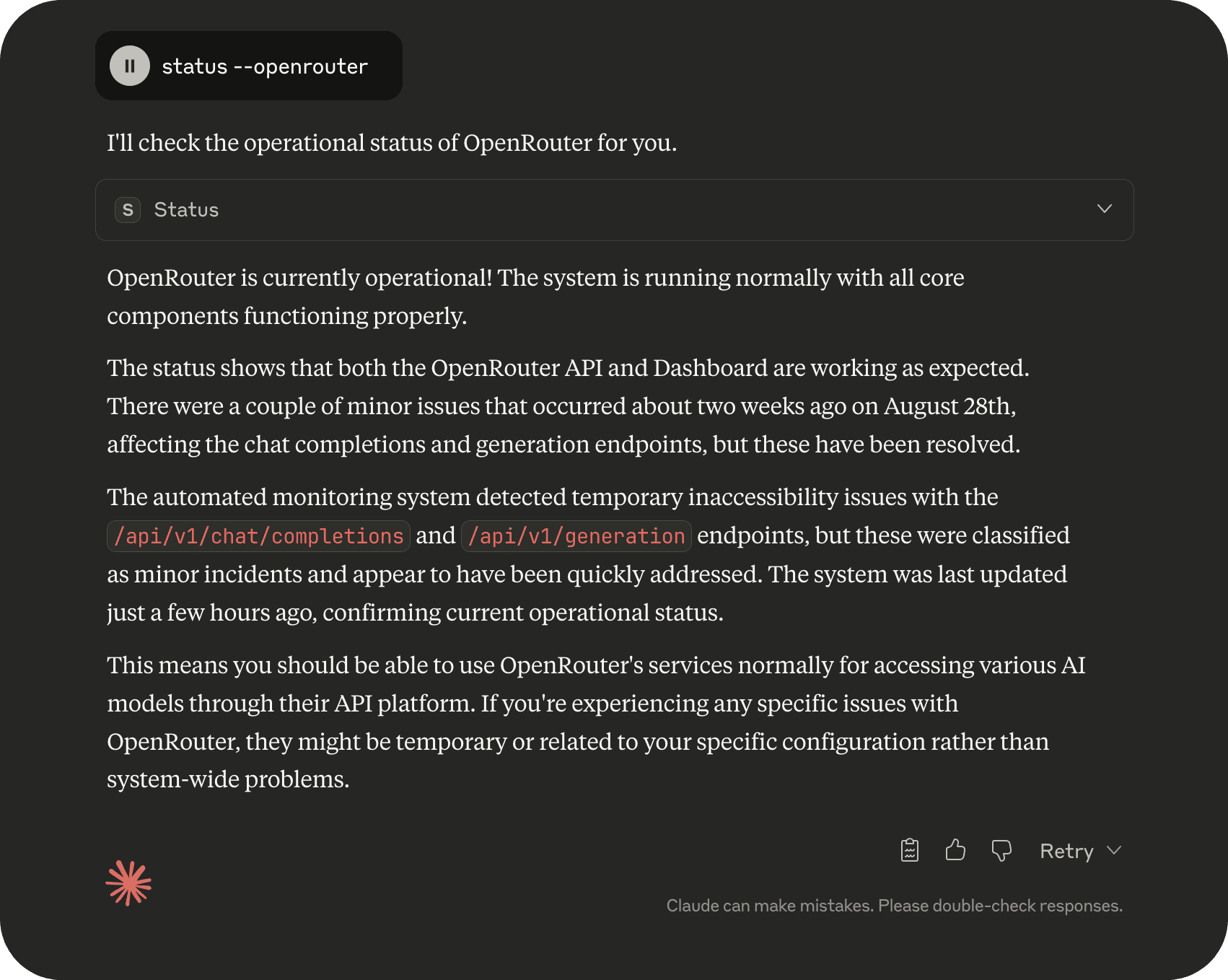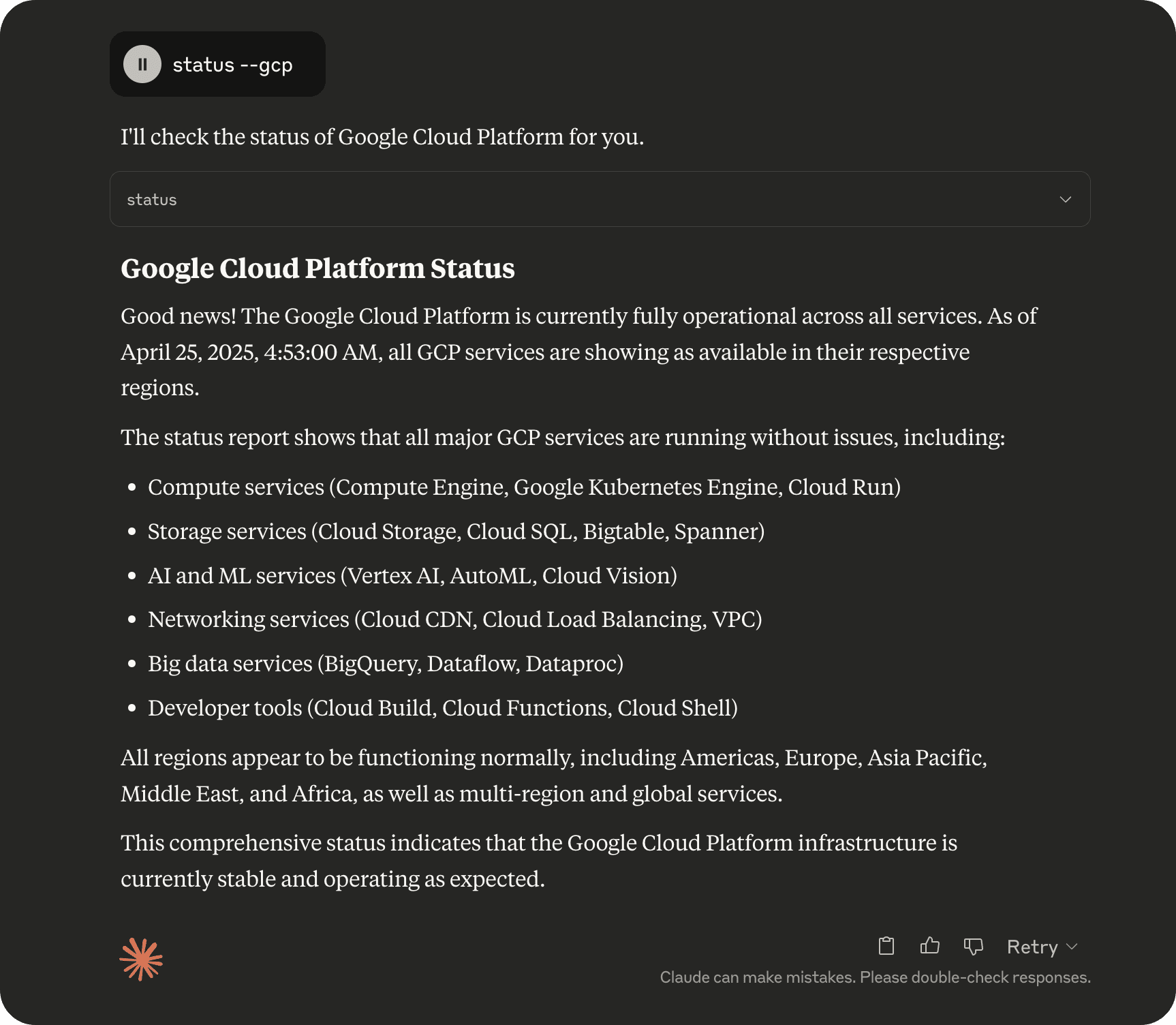This server allows you to monitor and query the operational status of major digital platforms through a simple interface:
Check specific platform status: Use
status --[platform](e.g.,status --github) to check a specific platformList all available platforms: Use
status listto see all supported platformsCheck all platform statuses: Use
status --allto get the status of all platforms at onceReal-time updates: Receive up-to-date information on operational health of platforms like GitHub, Slack, Discord, Docker, and more
Monitors operational status of Asana platform and provides real-time updates about service availability and component health.
Tracks and reports on the operational status of Atlassian services, allowing queries about current service health and availability.
Provides detailed status information about Cloudflare's global infrastructure and services, including regional performance data and maintenance status.
Monitors the operational status of DigitalOcean's cloud infrastructure and reports on service availability and performance.
Tracks Discord platform status, offering real-time information about service availability and component health.
Monitors Dropbox service status and provides current information about platform availability and performance.
Provides detailed status information for GitHub's infrastructure, including Git operations, API requests, Actions, Webhooks, Issues, Pull Requests, and other components.
Monitors the operational status of Google Cloud Platform services and provides real-time updates about service health and availability.
Tracks Netlify platform status and provides information about service availability and performance.
Monitors the operational status of npm registry and related services, reporting on current availability and performance.
Tracks Reddit platform status and provides information about service health and component availability.
Monitors Slack's operational status and provides real-time information about service availability and component health.
Tracks the operational status of Twilio services and reports on current availability and performance metrics.
Provides detailed status information about Vercel's global edge network and deployment infrastructure, including API, Dashboard, Builds, Serverless Functions, and CDN availability.
Click on "Install Server".
Wait a few minutes for the server to deploy. Once ready, it will show a "Started" state.
In the chat, type
@followed by the MCP server name and your instructions, e.g., "@Status Observer MCPcheck the status of GitHub and OpenAI"
That's it! The server will respond to your query, and you can continue using it as needed.
Here is a step-by-step guide with screenshots.
MCP Status Observer
This project is continuously updated with new platform integrations. If you're not seeing a service that should be available, or if Claude doesn't recognize a platform, please update by runningnpm run build from a freshly cloned repository.
Last updated: 2025-09-12T07:22:15Z (UTC) - Added OpenRouter status integration with RSS incident tracking
Features
Monitor world's most used digital platforms (GitHub, Slack, Discord, etc.)
Track AI providers including OpenRouter, OpenAI, Anthropic, and Gemini
Get detailed status information for specific services with incident history
Check status of specific components within each platform
Real-time updates of service status with impact analysis
Comprehensive incident tracking with resolution status and timelines
Simple query interface with commands like
status --openrouter
Related MCP server: Portainer MCP
Demo
Click on any timestamp to jump to that section of the video
00:00 - LinkedIn Platform Status Assessment
Comprehensive analysis of LinkedIn's operational health, including detailed examination of core services such as LinkedIn.com, LinkedIn Learning, Campaign Manager, Sales Navigator, Recruiter, and Talent solutions. All systems confirmed fully operational with zero service disruptions.
00:20 - GitHub Infrastructure Status Overview
Detailed evaluation of GitHub's service availability, covering critical components including Git operations, API requests, Actions, Webhooks, Issues, Pull Requests, Packages, Pages, Codespaces, and Copilot functionality. Complete operational status confirmed across all GitHub services.
00:40 - Vercel Platform Reliability Analysis
In-depth examination of Vercel's global edge network and deployment infrastructure, featuring comprehensive status reporting on core services such as API, Dashboard, Builds, Serverless Functions, Edge Functions, and global CDN locations. All Vercel services verified operational across all regions.
01:08 - Cloudflare Network Status Examination
Extensive analysis of Cloudflare's global infrastructure status, detailing service availability across geographic regions and specific service components. Identified performance degradation in multiple regions (Africa, Asia, Europe, Latin America, Middle East, North America) while core services remain functional. Includes detailed assessment of regional data centers under maintenance and technical impact analysis.
01:46 - Global Operational Status Report
Consolidated overview of operational status across all major technology platforms and service providers, highlighting both fully operational services (GitHub, Vercel, Netlify, Asana, Atlassian, OpenRouter, etc.) and services experiencing degraded performance (Cloudflare, Twilio). Includes strategic recommendations for organizations with dependencies on affected services.
Requirements
Node.js 16 or higher
Claude Desktop
Internet connection to access status APIs
Installation
Installing Manually
Clone or download this repository:
Install dependencies:
Build the project:
Running the MCP Server
There are two ways to run the MCP server:
Option 1: Running manually
Open a terminal or command prompt
Navigate to the project directory
Run the server directly:
Keep this terminal window open while using Claude Desktop. The server will run until you close the terminal.
Option 2: Auto-starting with Claude Desktop (recommended for regular use)
The Claude Desktop can automatically start the MCP server when needed. To set this up:
Configuration
The Claude Desktop configuration file is located at:
macOS:
~/Library/Application Support/Claude/claude_desktop_config.jsonWindows:
%APPDATA%\Claude\claude_desktop_config.jsonLinux:
~/.config/Claude/claude_desktop_config.json
Edit this file to add the Status Observer MCP configuration. If the file doesn't exist, create it:
Important: Replace ABSOLUTE_PATH_TO_DIRECTORY with the complete absolute path where you installed the MCP
macOS/Linux example:
/Users/username/mcp-status-observerWindows example:
C:\\Users\\username\\mcp-status-observer
If you already have other MCPs configured, simply add the "statusObserver" section inside the "mcpServers" object. Here's an example of a configuration with multiple MCPs:
The MCP server will automatically start when Claude Desktop needs it, based on the configuration in your claude_desktop_config.json file.
Usage
Restart Claude Desktop after modifying the configuration
In Claude, use the
statuscommand to interact with the Status Observer MCP ServerThe MCP server runs as a subprocess managed by Claude Desktop
Available Commands
The Status Observer MCP provides a single tool named status with several commands:
Command | Description | Parameters | Example |
| List all available platforms | None |
|
| Get status for a specific platform | Platform name |
|
| Get status for all platforms | None |
|
Supported Platforms
The Status Observer monitors 22 major digital platforms across various categories:
AI & Machine Learning (4)
OpenRouter - AI model routing and access platform
OpenAI - Leading AI services provider (ChatGPT, DALL-E, API)
Anthropic - AI assistant provider (Claude)
Gemini - Google's multimodal AI platform
Cloud Infrastructure (4)
Google Cloud Platform - Comprehensive cloud computing services
DigitalOcean - Developer-focused cloud infrastructure
Vercel - Frontend deployment and edge platform
Netlify - Web development and deployment platform
Developer Tools & Platforms (5)
Docker - Container platform and services
GitHub - Version control and collaboration platform
npm - JavaScript package manager and registry
Atlassian - Developer collaboration tools (Jira, Bitbucket, Confluence)
Supabase - Open source backend platform (PostgreSQL, auth, storage)
Productivity & Collaboration (5)
LinkedIn - Professional networking platform
Slack - Business communication and collaboration
Asana - Team workflow and project management
Dropbox - Cloud file storage and collaboration
X (Twitter) - Social media and real-time communication
Web Infrastructure & Security (3)
Cloudflare - Web infrastructure, CDN, and security
Discord - Developer community and communication platform
Reddit - Social news and developer community platform
Analytics & Business Tools (1)
Amplitude - Product analytics platform
Example Usage
Here are various examples of how to use the Status Observer with Claude:
Direct Commands:
Preview


Natural Language Prompts:
You can also interact with the MCP using natural language. Claude will interpret these requests and use the appropriate commands:
"Could you check if OpenRouter is having any API issues right now?"
"What's the status of OpenAI's ChatGPT service?"
"Has there been any recent incidents with Claude or the Anthropic API?"
"Is Google Cloud Platform experiencing any outages in my region?"
"Check if Docker Hub is operational for automated builds"
"What's the current status of LinkedIn's Sales Navigator?"
"Can you tell me if Google's Gemini AI is experiencing any service disruptions?"
"Show me the status of all AI platforms including OpenRouter and OpenAI"
"Are there any active incidents affecting GitHub Actions or Git operations?"
"Check the overall health of Vercel and Netlify for my deployment pipeline"
"Has Supabase had any recent database or authentication issues?"
"What's the status of all major platforms right now?"
Troubleshooting
"Server disconnected" error
If you see the error "MCP Status Observer: Server disconnected" in Claude Desktop:
Verify the server is running:
Open a terminal and manually run
node build/index.jsfrom the project directoryIf the server starts successfully, use Claude while keeping this terminal open
Check your configuration:
Ensure the absolute path in
claude_desktop_config.jsonis correct for your systemDouble-check that you've used double backslashes (
\\) for Windows pathsVerify you're using the complete path from the root of your filesystem
Tools not appearing in Claude
If the Status Observer tools don't appear in Claude:
Make sure you've restarted Claude Desktop after configuration
Check the Claude Desktop logs for any MCP communication errors
Ensure the MCP server process is running (run it manually to confirm)
Verify that the MCP server is correctly registered in the Claude Desktop MCP registry
Checking if the server is running
To check if the server is running:
Windows: Open Task Manager, go to the "Details" tab, and look for "node.exe"
macOS/Linux: Open Terminal and run
ps aux | grep node
If you don't see the server running, start it manually or use the auto-start method.
Contributing
Adding New Status APIs
Contributors can easily add support for additional platforms by modifying the initializePlatforms method in src/index.ts. The process is straightforward:
Identify a platform's status API endpoint
Add a new entry using the
addPlatformmethod with the following parameters:id: A unique identifier for the platform (lowercase, no spaces)name: The display name of the platformurl: The status API endpoint URLdescription: A brief description of the platform
Example:
Custom API Integration
For platforms with non-standard status pages (like OpenRouter, OpenAI, Anthropic), you can create custom handlers:
Add the platform to
initializePlatforms()Create a TypeScript interface for the response format
Add a specific handler method like
getOpenRouterStatus()Update the main
getPlatformStatus()method to route to your handlerAdd quick status support in
getQuickPlatformStatus()
Example structure for custom handlers:
Platform Categories
When adding new platforms, consider organizing them into logical categories:
AI/ML: OpenRouter, OpenAI, Anthropic, Gemini
Cloud Infrastructure: GCP, AWS, Azure, DigitalOcean
Developer Tools: GitHub, GitLab, Docker, npm
Productivity: Slack, Microsoft 365, Google Workspace
Web Infrastructure: Cloudflare, Fastly, Akamai
License
This project is licensed under the Mozilla Public License 2.0 - see the LICENSE file for details.
Related Links
Changelog
2025-09-12: Added OpenRouter integration with RSS incident tracking and detailed impact analysis
2025-04-26: Added Docker status integration with comprehensive component monitoring
2025-03-15: Enhanced GCP regional status reporting with incident correlation
2025-02-28: Added Anthropic and Gemini AI platform monitoring
2025-01-20: Initial release with core platform support (GitHub, Vercel, Cloudflare, etc.)
Built for the developer community by